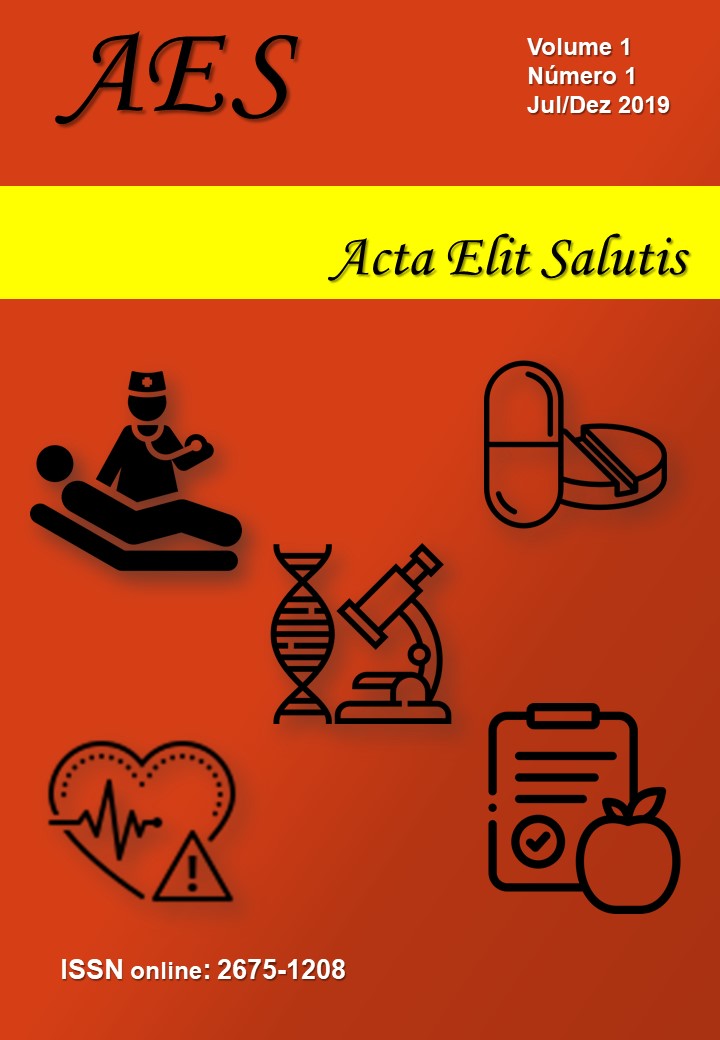The prevalence of supplementation of B12 vitamin in vegetarian of Blumenau regional university (FURB)
DOI:
https://doi.org/10.48075/aes.v1i1.23742Keywords:
Vitamin, B12 Vitamin, Vegetarian, Supplementation, FURBAbstract
The vegetarian diet is common in the world. In Brazil about 14% of the population is vegetarians, representing around 30 million people, according to estimates of the Brazilian Vegetarian Society. The objective of this study is to evaluate the prevalence of vitamin B12 supplementation in vegetarians at the Regional University of Blumenau (FURB), since vitamin B12 is synthesized by bacteria and found in animal products, isn’t present in adequate quantities in products of plant origin, since the plants don’t need vitamin B12. The research was carried out with vegetarians FURB students. A questionnaire with 13 questions was applied by Google form and sent by e-mail, for 20 people, with questions regarding vitamin B12 supplementation and vegetarianism. The results were transformed into graphs to better understand and interpret the data. It was found that 60% of the participants were lacto-ovo-vegetarians and 40% strict vegetarians, 50% made vitamin B12 supplementation where the majority does oral supplementation and 15% use 2.4 to 100mcg per day. It is possible to observe that 75% of the participants of the research are followed up with biochemical tests, which is important to evaluate the need for supplementation. Regarding the symptoms, 35% do not present symptoms, fact that can be associated to the short period of diet, less than 3 years. Since vitamin B12 has hepatic stock. It was concluded that vitamin B12 supplementation, although necessary, is not adopted by the vegetarians in this study, even most doing supplementation.
References
-KRAJCOVICOVA-KUDLACKOVA M, et al. Traditional and alternative nutrition--levels of homocysteine and lipid parameters in adults. Scand J Clin Lab Invest. Pubmed [Internet]. 2000 Dec [cited 2018 Jun 15]; 60(8):657-64. Avaliable from: https://www.ncbi.nlm.nih.gov/pubmed/11218148 doi: 10.1080/00365510050216385
-MIRANDA D, et al. Qualidade nutricional de dietas e estado nutricional de vegetarianos. Demetra Alimentação, Nutrição e Saúde. E-publicacoes [Internet]. 2013 [cite 2018 Jun 16]; 8(2):163-172. Avaliabe from:
https://www.e-publicacoes.uerj.br/index.php/demetra/article/view/4773/5167
-MORALEJO SC. Nutrição no atleta vegetariano [dissertação]. Porto: Universidade Fernando Pessoa; 2014.
-RIBEIRO LS, et al. Dieta vegetariana: o que falta saber sobre o papel do selénio na proteção contra doenças? Concurso de Mérito acadêmico do Centro Vegetariano, Portugal, pg. 1-2, 2010.
-SABATÉ J. The contribution of vegetarian diets to health and disease: a paradigm shift? Am J Clin Nutr. 2003;78 Suppl 3:502S-507S.
-SLYWITCH E. Alimentação sem carne: Um guia prático para montar sua dieta vegetariana com saúde. Segunda edição. Alaúde, p. 141, 2015.
-SLYWITCH E. Guia alimentar de dietas vegetarianas para adultos. Sociedade Vegetariana Brasileira; 2012.
-SVB.ORG. Pesquisa do IBOPE aponta crescimento histórico no número de vegetarianos no Brasil. 2018. Sociedade Vegetariana Brasileira. [acesso 23 jul. 2018] Disponível em: https://www.svb.org.br/2469-pesquisa-do-ibope-aponta-crescimento-historico-no-numero-de-vegetarianos-no-brasil
-VITOLO M. Nutrição da gestação ao envelhecimento. Rubio: Rio de Janeiro; 2015.
Downloads
Published
How to Cite
Issue
Section
License
Copyright (c) 2019 Acta Elit Salutis

This work is licensed under a Creative Commons Attribution-NonCommercial-ShareAlike 4.0 International License.
Aviso de Direito Autoral Creative Commons
Política para Periódicos de Acesso Livre
Autores que publicam nesta revista concordam com os seguintes termos:
1. Autores mantém os direitos autorais e concedem à revista o direito de primeira publicação, com o trabalho simultaneamente licenciado sob a Licença Creative Commons Attribution que permite o compartilhamento do trabalho com reconhecimento da autoria e publicação inicial nesta revista.2. Autores têm autorização para assumir contratos adicionais separadamente, para distribuição não-exclusiva da versão do trabalho publicada nesta revista (ex.: publicar em repositório institucional ou como capítulo de livro), com reconhecimento de autoria e publicação inicial nesta revista.
3. Autores têm permissão e são estimulados a publicar e distribuir seu trabalho online (ex.: em repositórios institucionais ou na sua página pessoal) a qualquer ponto antes ou durante o processo editorial, já que isso pode gerar alterações produtivas, bem como aumentar o impacto e a citação do trabalho publicado (Veja O Efeito do Acesso Livre).
Licença Creative Commons
Esta obra está licenciada com uma Licença Creative Commons Atribuição-NãoComercial-CompartilhaIgual 4.0 Internacional, o que permite compartilhar, copiar, distribuir, exibir, reproduzir, a totalidade ou partes desde que não tenha objetivo comercial e sejam citados os autores e a fonte.





